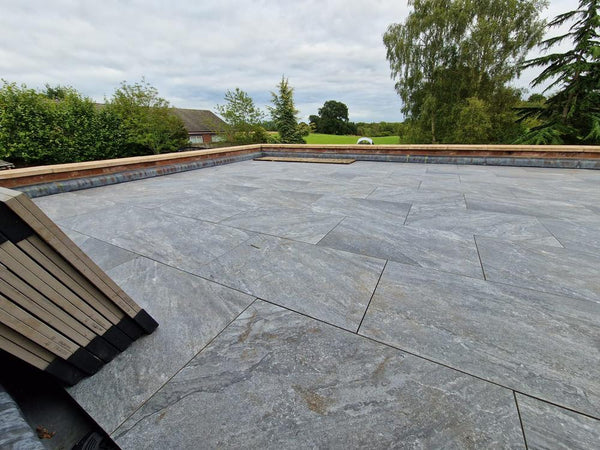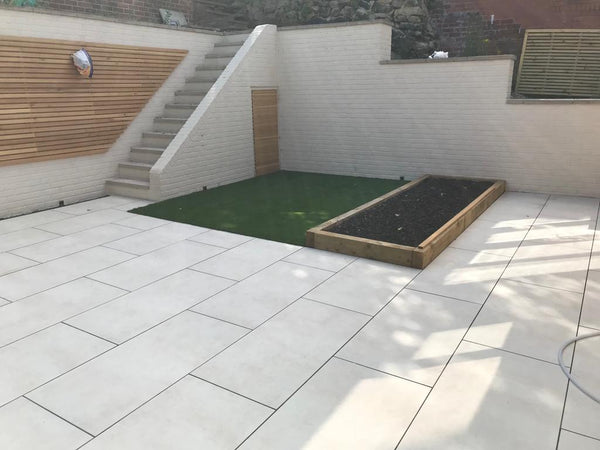Understanding the weight of porcelain tile is essential for anyone looking to enhance their outdoor spaces with this durable and elegant flooring option.
At Ovaeda, our years of experience have shown us that the weight can vary significantly, impacting everything from transportation to installation and the overall design of your outdoor area.
This article delves into the specifics of porcelain tile weight, why it's important to consider, how to calculate it, and how it compares to ceramic tile, ensuring you have all the information needed to make informed decisions for your decking and outdoor projects.
What this article covers:- How Much Does Porcelain Tile Weigh?
- Porcelain Tile vs Ceramic Tile: Which Is Heavier?
- Weight of Porcelain Tile (FAQs)
How Much Does Porcelain Tile Weigh?
From our extensive experience, the weight of porcelain tiles can vary, but to give you a ballpark figure, a standard 60x60 cm tile usually weighs around 15 kg.
If you're buying by the box, which typically contains 15 tiles, you're looking at a weight range of 15 to 30 pounds per box. It's quite fascinating when you think about it, the elegance of porcelain with the robustness to match! If you buy a pallet of 64, you’re looking at 900-1000 kg.
Why Should You Weigh Floor Tiles?
Now, you might wonder, "Why on earth do I need to weigh my tiles?" Well, it's all about preparation and ensuring your outdoor space can support your design dreams.
After putting it to the test, we've found that understanding the weight helps in designing a structure that's not just beautiful but also sturdy and reliable. After all, we want your outdoor oasis to stand the test of time.
How Much Weight Can Be Supported By Porcelain Tile?
In areas with just foot traffic, they can last for decades. However, if you're planning to place heavier items, like a hefty garden bench or a barbecue grill, it's crucial to consider the strength grade of the porcelain.
Ideally, the best porcelain tiles should have an absorption value below 0.50% and an average breaking strength of 275 pounds of force. It's all about ensuring longevity and durability.
How To Calculate Tile Weight
Calculating the weight of your tiles is simpler than you might think. Start by considering the weight of one square foot of tile, which for unglazed porcelain is about 13 pounds per square inch of thickness.
Multiply the thickness of your tile by 13 to get the weight per square foot, and then multiply this by the total number of tiles. Voila, you have the total weight of your porcelain flooring!
Porcelain Tile vs Ceramic Tile: Which Is Heavier?
Through our research and hands-on experience, we've found that porcelain tiles, due to their denser nature, tend to be heavier than ceramic tiles of the same size.
This density not only contributes to the weight but also the durability and longevity of the tiles, making them a splendid choice for outdoor spaces.
How Much Weight Can Be Supported By Ceramic Tile?
When it comes to ceramic tiles, they're required to have a break strength of at least 250 pounds, as per ANSI standards.
However, the quality of the material can affect this, so it's always best to opt for high-quality tiles to ensure they can withstand the test of time and pressure.

Conclusion
The weight of porcelain tile plays a pivotal role in the planning and execution of outdoor flooring projects, influencing everything from structural requirements to aesthetic outcomes.
We've explored how to determine tile weight, its importance in design considerations, and the comparison between porcelain and ceramic tiles to arm you with the knowledge needed for a successful installation.
With this guide, you're well-equipped to make choices that ensure durability, beauty, and practicality in your outdoor spaces. For top-quality porcelain paving that promises to transform your outdoor areas, explore our collection at Ovaeda and make your dream space a reality.
Weight of Porcelain Tile (FAQs)
Can porcelain tiles be used for outdoor applications?
Yes, porcelain tiles are an excellent choice for outdoor applications due to their low water absorption rate, durability, and resistance to frost and temperature changes. They can withstand various weather conditions, making them ideal for patios, decks, and outdoor walkways.
How do I maintain porcelain tiles in an outdoor setting?
Maintaining porcelain tiles outdoors is relatively straightforward. Regular sweeping to remove debris and occasional washing with mild detergent and water will keep the tiles looking their best. Porcelain is resistant to staining, so it doesn't require extensive maintenance.

Can heavy furniture damage porcelain tiles outdoors?
Does porcelain tile break easily? One of the advantages of porcelain tiles is that they are known for their strength and durability.
However, it's important to choose tiles with the appropriate thickness and strength rating for your specific needs, especially if you plan to place heavy furniture on them. Using furniture pads or protective caps on legs can also help distribute the weight and prevent any potential damage.
If you want to learn more, why not check out these articles below:
- Porcelain Tiles on Pedestals
- What Gap Between Porcelain Slabs
- Does Porcelain Break Easily
- Does Composite Decking Fade?
- Does Composite Decking Expand?
- Is Composite Decking Cheaper Than Paving?
- Does Composite Decking Scratch?
- Can You Put Composite Decking on Wooden Joists?
- Types of Garden Flooring
- Can You Screw Composite Decking?
- Types of Composite Decking
- Balustrade
- Types of Balustrade
- Fitting Balustrade
- Balustrade Distance Between Posts